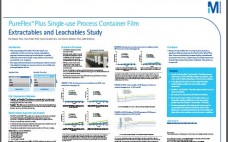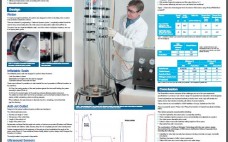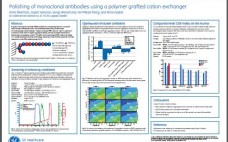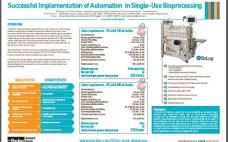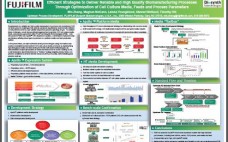Biopharmaceutical companies are using single-use disposable sterile containers and assemblies for upstream and downstream processes at an ever increasing rate, as these specialized technologies and products enable efficient and scalable processes. The newly developed PureFlex™ Plus film contains many of the same ultra low density polyethylene, poly(vinyl acetate) and poly(vinyl alcohol co-ethylene) layers that are in current PureFlex™ film.  The only modification is the outer layer, to provide enhanced mechanical strength, creep resistance and limited permeability to air and gases.…
Posters
Design and Manufacture of cGMP, Scalable Expanded Bed Adsorption Chromatography Columns
Expanded Bed Adsorption chromatography (EBA) allows clarification and direct product capture in one unit operation. Upflow conditions achieve a fluidized bed, twice the volume of the settled bed. Crude, high cell density and highly-viscous feed streams such as cell culture, foods and plasma are injected upflow. Cells, cell debris, host cell proteins (HCP’s) and DNA leave the expanded bed, whilst the target molecule is bound to the media. In order to facilitate a renaissance in EBA, columns built to current…
Polishing of Monoclonal Antibodies Using a Polymer Grafted Cation Exchanger
A typical monoclonal antibody purification process begins with a protein A capture step, followed by one or two polishing steps often using ion exchange chromatography media. This poster presents how to use the new cation exchange chromatography medium, Capto™ S ImpAct in MAb polishing. Capto S ImpAct is based on a newly developed grafting technology (Figure 1), resulting in high binding capacity and high resolution. To find the optimal conditions for static binding capacity of a MAb a screening was…
Novel Protein A Chromatography for Single-Use Facilities
Single-use technology has become increasingly popular in both upstream and downstream biopharmaceutical manufacturing. While there has been substantial adoption of upstream single-use technologies, there continues to be a lag in the development and adoption of single-use technologies in downstream – particularly in chromatography. To help achieve the vision of a completely disposable & flexible manufacturing platform, Grace has developed new high capacity pre-packed disposable protein A columns. The new columns integrate the technologies of Grace silica & surface chemistry with…
Automated Quantification of Residual Protein A ligands with Gyrolab™ Protein A Kit
The Gyrolab™ immunoassay platform is well established for automating bioanalytical assays at nanoliter-scale in discovery, pre-clinical, clinical and bioprocess environments. In this presentation, we will show a new kit developed by Gyros using proprietary reagents and technology for the quantification of residual Protein A in bioprocess samples typically from downstream purification. The kit is comprised of labeled anti-Protein A antibodies, buffers for acid dissociation of IgG from Protein A and a Gyrolab mixing CD that automates the acid dissociation and…
NatriFlo™ HD-Q: A High Performance Disposable Polishing Tool For MAb Purification
As biopharmaceutical developers embrace single-use technologies to reduce risk, improve process speed, efficiency and flexibility, they have found few options in downstream unit operations. With the introduction of Natrix hydrogel technology, developers now find a chromatographic tool that provides the binding capacity of the best modern resins, but with ten times higher flow rates. This study illustrates the NatriFlo HD-Q anion exchange adsorber which provides high productivity polishing for monoclonal antibody for GMP manufacturing, including under high conductivity conditions. This…
Successful Implementation of Automation in Single-Use Bioprocessing
Single-use bioprocessing is now common for the production of biopharmaceuticals. Existing and future biopharmaceuticals are extremely complex molecules that display structural heterogeneity. This heterogeneity must be carefully controlled in order to deliver consistently safe and efficacious product to patients. The FDA’s Guidance for Industry on Process Validation states that the manufacturer should understand the sources of variation be able to detect variation and understand the impact of variation on the process and ultimately the product. This presentation will review sources…
High Throughput Development of Non-Protein A Monoclonal Antibody Purification Process using Mini-Columns and Bio-Layer Interferometry
High throughput (HT) sorbent screening is widely used for developing purification process saving time and sample volume. This study describes the development of a non-protein A purification process for a monoclonal antibody (MAb) expressed in a CHO cell supernatant. For the capture step, 54 process conditions were screened in three days using 200 µL mini-columns packed with five different sorbents. Capacity and yield were evaluated using Bio-Layer Interferometry (BLI) with protein A biosensors and MAb purity, using SEC-HPLC. A 340-fold scale-up of…
Efficient Strategies to Deliver Reliable and High Quality Biomanufacturing Processes Through Optimization of Cell Culture Media, Feeds, and Process Parameters
Development of a reliable and high quality biomanufacturing process for recombinant CHO cell lines presents challenges from diverse nutritional requirements observed with different clonally derived cell lines, and variable response to process operating ranges. To address these challenges, we will discuss efficient approaches to optimize CHO cell culture media, feeds, and process parameters within FUJIFILM Diosynth Biotechnologies (FDB). Also discussed is FDB’s new ApolloTM CHO expression system, a cornerstone of process scale-up efficiency offering robust gene expression in a platform…
Evaluation of Rapid Quantitation Methods for Titer, HCP and ProA By Gyrolab Platform During In-Process Development
Getting biopharmaceuticals through development and into clinical proof-of-concept fast and efficiently is critical for success in our industry. Therefore, high-throughput upstream and downstream process development approaches are increasingly being implemented. Hence, innovative and high-throughput analytical technologies are needed to support rapid process development. A novel automated analytical platform-Gyrolab xP workstation was investigated for the analysis of IgG titer, Host Cell Protein (HCP) and leached ProA during in-process development. The assays are automated within a Gyrolab compact disc (CD) containing affinity-capture…

